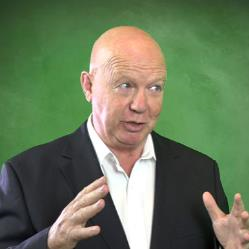
 In this 2 minute interview Steve Hall tells John Smibert how to build genuine rapport with your customer.
In this 2 minute interview Steve Hall tells John Smibert how to build genuine rapport with your customer.
He also debunks a number of rapport building methods that salespeople are often taught - methods that can often do more damage than good.
Steve is a thought leader in sales. He's an author and writer, most notably for BRW, and his focus is on helping people sell more effectively at higher margins.
See more of the 'TALKING SALES' series here
Interview
John: Steve, last time you raised the subject of putting yourself in the shoes of the customer and you mentioned the word "building rapport". I'd like to explore that a little bit more. How do you go about building rapport and how do you coach your people to build rapport?
Steve: That's a good question, John. It's interesting because once upon a time I did NLP and I was taught to breathe in unison and match and mirror and all of these things.
And, you know, people talking about finding a common interest using referrals, and I guess you can do those things. But, to me, we're mixing up cause and effect. To me, rapport isn't something that you focus on, it's something that flows out of you being interested in what the customer or the prospect wants.
I find that if you're genuinely interested, if you really want to find out about that business, if you're asking them the details, if you dig and dig, and if you ask intelligent questions then by the very act of being desperate to understand what they need, wanting to know the nitty-gritty and how things work, getting to the heart of the picture, then you automatically end up perhaps matching and mirroring as a by-product.
So, rapport to me is something that comes out of genuinely wanting to know as much about the customer as possible.
John: So this old adage of walking in to their office and seeing that they've got a photograph of them being presented with a golf championship or whatever, and then starting a conversation about that is not applicable?
Steve: I think those people are busy, I think they want to get to business, and I think they want people that can add value. So I think you need to be able to ask intelligent questions, I think you need to be able to add value as a by-product of the conversation, and I think you really want to help them and want to know how you can best help them.
John: But in doing so also be personable, relaxed, communicative, and a great listener.
Steve: Oh, I think that goes without saying. I mean, one of the things about being a great listener - write it down I say, when you're listening to someone; write it down. It makes a big difference to how they perceive you and it makes a big difference to what you remember.
John: So, have a pen and paper and make sure you're writing down what they say, and they're going to have much more respect for what you're doing and the fact that you are listening.
Steve: Absolutely.
****************
See more of the 'TALKING SALES' series here
****************

Your Invitation: I invite you to join the Sales Leader Forum group on LinkedIn where you can experience informative discussions with your peers and sales thought leaders on subjects like the one we have discussed here. I also invite you to subscribe to the
- Sales Leader Resource Centre here
- Sales Leader YouTube channel here (300+ sales leadership videos)
Please Share: If you valued this article, please share via your Twitter, LinkedIn, Google+ and Facebook social media platforms. I encourage you to join the conversation or ask questions. So feel free to add a comment on this post - I promise to respond. If inclined please follow my LinkedIn post page here.
Want to touch base? If you have questions please feel free to contact me - email: john.smibert(at)salesleaderforums.com, Phone: +61 404857893 or Skype: john.smibert